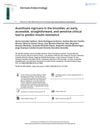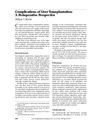 142 citations,
March 2019 in “Frontiers in Cellular Neuroscience”
142 citations,
March 2019 in “Frontiers in Cellular Neuroscience” The document concludes that adenosine receptor agonists have potential for treating various conditions, but only a few are approved due to challenges like side effects and the need for selective activation.
 50 citations,
October 2009 in “Clinical Endocrinology”
50 citations,
October 2009 in “Clinical Endocrinology” Hair loss in young men linked to higher risk of insulin resistance and metabolic issues.
 November 2017 in “Elsevier eBooks”
November 2017 in “Elsevier eBooks” PCOS is a genetic disorder affecting women's reproductive health, with treatments focused on symptoms like insulin resistance and fertility.
[object Object] 8 citations,
September 2005 in “Practical diabetes” PCOS is a condition causing irregular periods, excess male hormones, and infertility, often managed by targeting insulin resistance and specific symptoms.
 4 citations,
December 2022 in “Frontiers in Endocrinology”
4 citations,
December 2022 in “Frontiers in Endocrinology” Treating non-classic congenital adrenal hyperplasia is complex because the benefits of hormone treatment must be weighed against potential health risks.
 May 2024 in “Journal of drug delivery and therapeutics”
May 2024 in “Journal of drug delivery and therapeutics” Women with PCOS have higher oxidative stress and hormone imbalances, suggesting managing oxidative stress could help.
 6 citations,
January 2018 in “Dermato-endocrinology”
6 citations,
January 2018 in “Dermato-endocrinology” Darkened knuckles can be an early sign of insulin resistance.
 November 2019 in “Harper's Textbook of Pediatric Dermatology”
November 2019 in “Harper's Textbook of Pediatric Dermatology” The document is a detailed medical reference on skin and genetic disorders.
 February 2022 in “Mediators of Inflammation”
February 2022 in “Mediators of Inflammation” Women with Polycystic Ovary Syndrome (PCOS) have lower levels of a substance called DIAPH1 in their blood, which is linked to changes in sugar metabolism and insulin resistance.
 68 citations,
January 2022 in “International Journal of Molecular Sciences”
68 citations,
January 2022 in “International Journal of Molecular Sciences” PCOS management includes lifestyle changes and medications, with ongoing research into repurposed drugs for better treatment options.
 16 citations,
April 2018 in “Current opinion in gynecology and obstetrics”
16 citations,
April 2018 in “Current opinion in gynecology and obstetrics” Hispanic women with PCOS are more likely to have liver diseases like NAFLD and NASH.
5 citations,
February 2017 in “Cochrane library” There is not enough evidence to know if different ways of putting in eye drops for glaucoma work better than others.
 4 citations,
December 2021 in “Experimental and Therapeutic Medicine”
4 citations,
December 2021 in “Experimental and Therapeutic Medicine” Adult female acne is complex and requires a combination of treatments for effective management.
2 citations,
October 2019 in “Nanomedicine” Pharmaceutical care in transplantation faces challenges but has promising future opportunities for better outcomes.
 2 citations,
July 1999 in “Liver transplantation and surgery”
2 citations,
July 1999 in “Liver transplantation and surgery” Liver transplant can lead to neurological, pulmonary, cardiovascular, and renal complications, with older patients facing higher risks.
 418 citations,
June 2003 in “Endocrine Reviews”
418 citations,
June 2003 in “Endocrine Reviews” While PCOS might increase the risk of heart disease, there's not strong evidence to prove it causes earlier heart problems.
 26 citations,
June 2016 in “Journal of Reproductive Immunology”
26 citations,
June 2016 in “Journal of Reproductive Immunology” Women with PCOS have higher xanthine oxidase activity linked to inflammation and heart disease risks.
 31 citations,
October 2015 in “DOAJ (DOAJ: Directory of Open Access Journals)”
31 citations,
October 2015 in “DOAJ (DOAJ: Directory of Open Access Journals)” Polycystic Ovary Syndrome (PCOS) is not very common among Iranian women, but it's important to prevent it because of the risk of heart disease and infertility.
 March 2023 in “Cellular Molecular and Biomedical Reports”
March 2023 in “Cellular Molecular and Biomedical Reports” The study found that heart disease is common in people with PCOS and that being overweight is a major risk factor; lifestyle changes and medication are important for management.
46 citations,
June 2015 in “American Journal Of Pathology” Diabetes causes lasting cell dysfunctions, leading to serious complications even after blood sugar is controlled.
 15 citations,
April 2018 in “Revista Brasileira de Ginecologia e Obstetrícia”
15 citations,
April 2018 in “Revista Brasileira de Ginecologia e Obstetrícia” Insulin resistance is common in PCOS patients and linked to obesity and increased cardiovascular risk.
 1 citations,
April 2021 in “Undergraduate Research in Natural and Clinical Science and Technology (URNCST) Journal”
1 citations,
April 2021 in “Undergraduate Research in Natural and Clinical Science and Technology (URNCST) Journal” PCOS can harm heart health by increasing risks like high blood pressure and diabetes, but treatments like birth control and lifestyle changes can help.
 15 citations,
August 2021 in “Reviews in endocrine and metabolic disorders”
15 citations,
August 2021 in “Reviews in endocrine and metabolic disorders” COVID-19 and hypopituitarism (reduced pituitary gland function) are linked, with the latter's related health issues potentially worsening COVID-19 outcomes, and COVID-19 possibly increasing risk for pituitary complications.
 25 citations,
November 2022 in “British journal of dermatology/British journal of dermatology, Supplement”
25 citations,
November 2022 in “British journal of dermatology/British journal of dermatology, Supplement” Baricitinib for severe alopecia areata is generally safe, with common side effects like infections and acne, and low rates of serious complications.
 17 citations,
January 2001 in “Clinical and Experimental Dermatology”
17 citations,
January 2001 in “Clinical and Experimental Dermatology” Early treatment with immunoglobulin and aspirin reduces heart complications in children with Kawasaki disease.
 June 2022 in “International journal of research and review”
June 2022 in “International journal of research and review” The article concludes that early diagnosis and lifestyle changes can prevent complications from high uric acid levels.
 April 2024 in “Canadian Women s Health Today”
April 2024 in “Canadian Women s Health Today” PCOS treatment focuses on lifestyle changes and specific medications to manage symptoms and complications.
December 2019 in “Orvostudományi Értesítö” Lifestyle changes, medications, and fertility treatments can improve PCOS symptoms and prevent complications.
 9 citations,
July 2009 in “Journal Of Endocrinology, Metabolism And Diabetes Of South Africa”
9 citations,
July 2009 in “Journal Of Endocrinology, Metabolism And Diabetes Of South Africa” The document concludes that managing PCOS involves treating symptoms and reducing long-term metabolic risks, with lifestyle changes being important.
[object Object]  July 2015 in “Cambridge University Press eBooks”
July 2015 in “Cambridge University Press eBooks” The document concludes that careful history and physical exams are crucial for accurately diagnosing polycystic ovary syndrome and distinguishing it from other similar conditions.
























